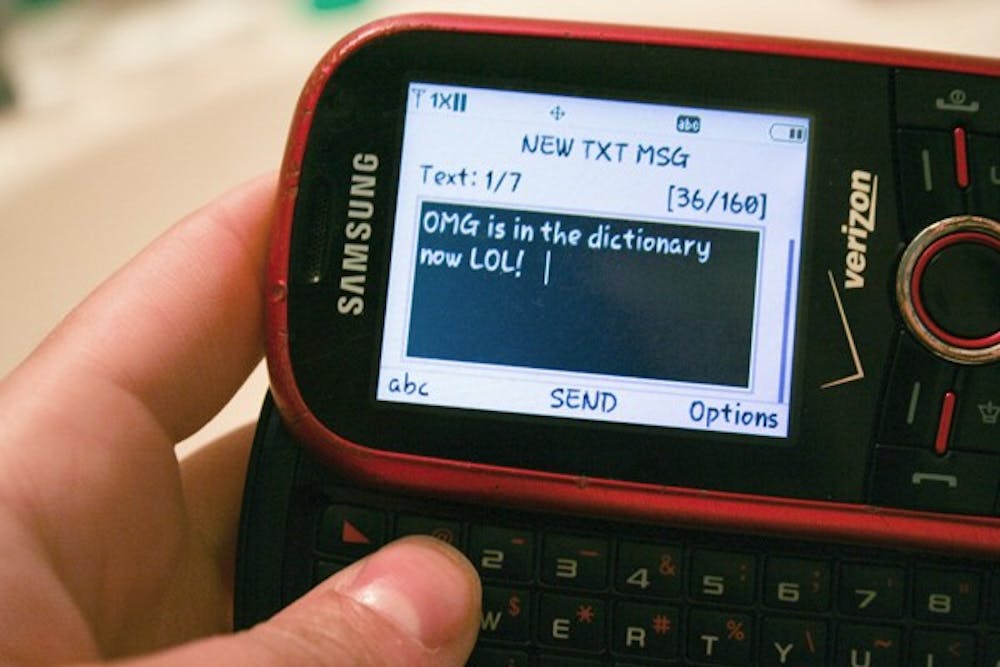Get ready to make the dictionary your new BFF and don’t forget to make a, “I <3 English,” T-shirt, LOL.
In its quarterly update last week, the Oxford English Dictionary adopted words commonly found on Twitter, Facebook or in a text message.
Coined “initialisms,” words like OMG, LOL, TMI, FYI and more were inducted into the pages of the dictionary’s online edition, generating discussion of whether these terms commonly reserved to informal arenas will be accepted academically.
Retha Hill, director of the New Media Innovation Lab at ASU’s Walter Cronkite School of Journalism and Mass Communication said, “as a living, breathing dictionary,” it is about time the OED recognized these terms.
“All of these terms have gotten into the lexicon of English, and especially American usage, so I think it’s fair game for the Oxford English Dictionary to include those,” she said. “Over the years you’ve seen the Oxford English Dictionary add terminology from the ’60s, ’70s, ’80s, ’90s and certainly the second decade of the 21st century.”
According to the OED, OMG was first used in a personal letter that dates back to 1917. LOL, now defined as “laughing out loud,” was first used in 1960 to denote a “little old lady.”
English professor James Wermers said in time, they will probably trace the origins back further.
“The suggestion seems to be [that] there’s a history for these things and it’s part of a growing way of communicating and growing technology,” he said. “Recognizing that language is growing, shifting and changing is something we have to do.”
Both Hill and Wermers cited the uprising in Egypt as an example of the benefits of technology that requires such acronyms or terms.
“I don’t know if during the revolution in Egypt they were tweeting things like LOL, but I wouldn’t be surprised if that didn’t make it into text messages that were going around the country trying to get people to participate in the demonstrations,” Hill said.
Though appropriate in written form, simply saying that someone is your BFF or hearing a professor say OMG when you forget your paper is still not widely understood.
“I’m not sure that I ever want someone to look at me and go, ‘LOL’ or ‘OMG’. There’s a problem with that,” Wermers said. “When we sit down and talk to each other we should be taking the time to talk to each other, so acronyms and shortened things, we don’t need to use them.”
For many ASU students, access to computers and the Internet has been available for the majority of their lifetime. Marketing junior Nick McDonald said he sees people use words like LOL and OMG, “all the time.”
“There’s always been slang, shortened words, shortened ways to say things online,” he said.
Although McDonald sees initialisms on social networking sites like Facebook, he doesn’t think it will make them more appropriate for writing or speaking.
Wermers said he has never come across a student using text lingo in formal papers because high school teachers have made sure they do not use them.
Hill worries that preteens in middle school might not understand the appropriate time to use such words.
“I can imagine a 10- or 11-year-old using short hand language so much and then when it’s time to write an essay, I wouldn’t be surprised to see some of this alternative spelling in their school essays,” she said.
Knowing word etiquette for certain social situations seems to be a factor in an individual’s usage.
“If we’re being ironic, maybe there is room to drop the occasional OMG in conversation,” Wermers said.
Despite feelings of the possible destruction of the English language with words like muffin top, defined as, “a roll of flesh which hangs visibly over a person’s tight-fitting waistband,” Wermers said he is interested to see how the new additions to the OED will affect Scrabble rules.
“Not that you can score a lot of points with LOL, but a WTF, that could be a big play,” he said.
Reach the reporter at tafergu1@asu.edu





